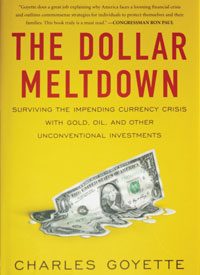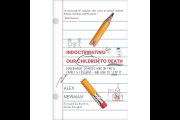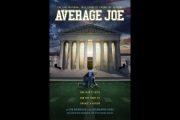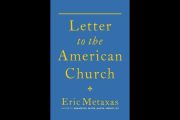
Radio host and author Charles Goyette has no doubt about the future of the U.S. dollar. The question isn’t whether the U.S. currency will become virtually worthless but when it will happen. Goyette wrote The Dollar Meltdown: Surviving the Impending Currency Crisis with Gold, Oil and Other Unconventional Investments for the express purpose of giving people an opportunity to protect themselves and their families in the face of what he contends is an inevitable collapse of the U.S. dollar, owing to the federal government’s outrageous inflationary spending.
There are numerous other books out there offering financial advice, proclaiming to help the reader get rich quick. Unlike those, this book instead attempts to help the readers preserve whatever they can of their existing savings in the face of the ongoing destruction of the U.S. fiat currency by the “wizards in Washington.” The book is broken up into sections that introduce a completely uninitiated reader to the detailed background of our current predicament before getting into the financial advice.
Goyette’s years on talk radio have served him well, as he is able to effectively communicate complex and challenging topics for a wide audience. His ability to keep things interesting and entertaining for the reader helps as he summarizes the history of fiat currencies, global empires, and the worsening U.S. predicament. “Such episodes are so frequent in history, they should not need retelling and the economics of unsound money should not need to be repeatedly reexperienced. But such lessons are seemingly never learned and so are replayed again and again. Sometimes the consequences are experienced in a more or less severe manner, but it is the same notes, only played in a different octave.” Through anecdotal examples and witty analysis, Dollar Meltdown is a much more readable book than others on a similar subject. It is informative but also keeps the reader engrossed enough to keep turning the pages. There are many amusing quotes and a few of his most memorable ones will stick with you after you’re done.
That is not to say the book is light-hearted. If anything, it’s a massive downer, as it takes a sober look at what lies ahead. America is on a collision course with bankruptcy. The Federal Reserve Notes we currently exchange as money are IOUs that our national leaders have overextended beyond the point of no return. “America’s national government has moved way beyond a political spoils system…. It has become a piñata: everybody gets a crack at it…. But the piñata does not survive the party. It is bashed to bits.” Goyette places the blame on the combination of foreign and domestic spending. “As the Romans discovered and Americans will learn to their great sorrow, empires are unsustainable edifices.” Still, such spending wouldn’t be possible without the machinations of the Federal Reserve. “The harm the Federal Reserve does is inescapable; it reaches everywhere, damaging every nook and cranny of the economy.”
As a believer in the Austrian School of economics, Goyette argues that the Federal Reserve itself is responsible for the booms and busts that rock our economy and result in establishment leaders expanding government power with bailouts and more control. Of course, this means that Goyette takes issue with the “conventional wisdom” trumpeted by the governing classes and their lapdog media that our present financial crisis was caused by insufficient government regulation. To say that the economic meltdown was caused by an insufficiency of regulation, Goyette says, is similar to “saying that the Titanic collapsed because of an insufficiency of ice.”
Goyette correctly identifies inflation as the increase in the supply of money and the corresponding rise in prices as a result of the devaluing of the currency (after all, as we know, if the supply of something increases, the demand will drop). The inflation of the money supply has the effect of devaluing the savings of holders of U.S. currency. People most hurt by inflation are those on fixed incomes such as the elderly who are living off their life savings. Those American citizens are helpless, as what they worked so hard to save is wiped away right from underneath them. Turning around the old quote from Ben Franklin, Goyette explains in the face of such inflation, “a penny saved is a penny wasted.”
Goyette’s warnings about a currency collapse are so well researched that they appear almost irrefutable. So what is the average person to do? As Goyette writes, “When the dollar bubble is finally burst, no other paper currency will be able to take its place — at least for a generation or two when the costly lessons of irredeemable paper currency may have to be relearned in another era.” Does this warning also include other nations’ fiat currency? “No recommendation is made to buy the paper money of some foreign country that holds its own currency reserves in U.S. dollars.” Indeed, according to Goyette, much of the paper money in circulation is merely a mirage of wealth with nothing to back it up but mountains of debt. So if paper currency is not what we should be investing in, then what?
Goyette’s advice on this subject consists of simple and easily achievable investment tips, which are explained in a similar fashion with a nice summary at each chapter’s end. Goyette recommends that the reader buy gold, but not any type of gold. He recommends one-ounce bullion type coins that you should keep in your possession. The chapter on gold explains what to look for, what not to buy, and multiple options for buying gold such as exchange-traded funds (ETF) which “are like mutual funds, but they trade throughout the day on a stock exchange.” Goyette also recommends investing in silver because, “a currency crisis will instantly thrust silver back into its role of a superior store of value where it will serve in a (perhaps non-circulating) monetary capacity.” He gives specific advice on what type of silver to purchase (U.S. silver coins) and explores other options for transferring your savings into silver. Goyette also recommends other nontraditional investment advice like oil ETFs and agricultural funds to hedge against rising energy and food prices amidst a depreciating currency. He also recommends specific funds to invest in for the coming bond market crash.
This review only touches the surface of Goyette’s advice. The book delves into much more detail on how to go about this new method of wealth preservation. Also, as Goyette himself repeatedly states, investing is highly personal and not only do you need to make sure your strategy is tailored to your individual needs, but you also should review investing decisions with your financial planner. Ultimately, the book leaves you depressed about what has happened to our once-great nation, but it also leaves you feeling like you have opportunities to plan and prepare for yourself.
The Dollar Meltdown: Surviving the Impending Currency Crisis with Gold, Oil and Other Unconventional Investments, by Charles Goyette, New York: Penguin Group Inc., 2009; 248 pages; hardcover; $27.95.



